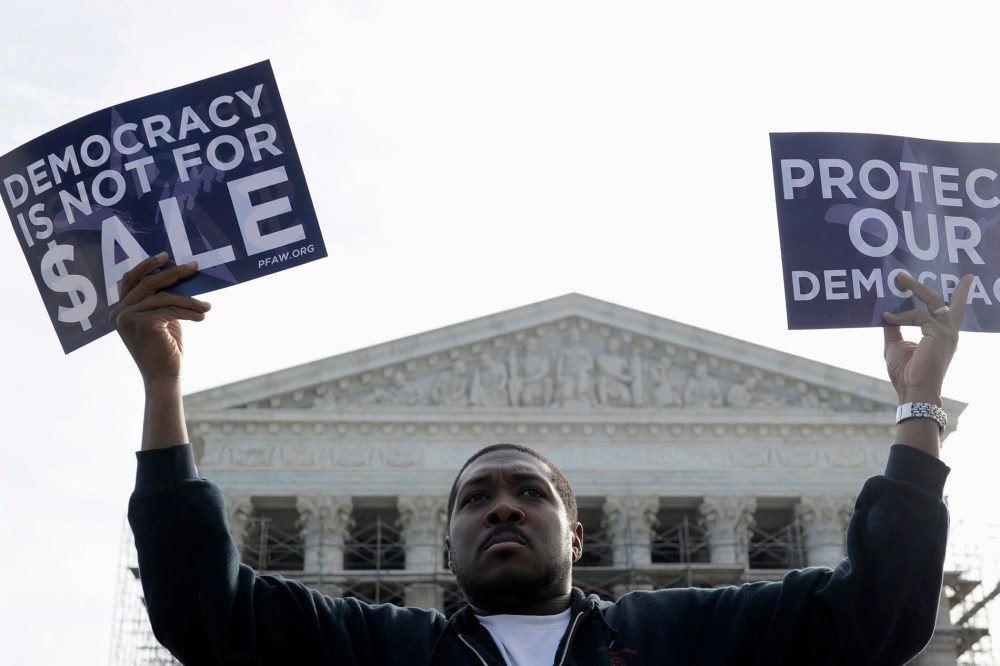Tucked onto page 1,599 of a 1,603 page bill to fund the government comes some pretty dry language riddled with semi-colons and sentences about segregated bank accounts.
But according to campaign finance watchdogs, the measure, attached to the larger bill that is expected to pass Congress before Thursday night in order to avert a government shutdown, represents a devastating secret assault on what’s left of the country’s campaign finance laws.

The language dramatically increases the amount of money individual wealthy donors can give to national party committees, especially for funds set aside for things like national party conventions and the improvement of headquarters building. Under the change, individual donors would see a tenfold increase on the amount of money they can give to national party organs, rising from the current $32,400-a-year cap to a $324,000 annual limit. When you add in money to congressional campaign committees, that means a single donor could give as much as $777,600 to official arms of the Democratic or Republican party in a single year — a dramatic increase from the current $97,200 limit.
Campaign finance watchdogs and good government groups are furious. They see the measure as adding to the drastic erosion in recent years of laws designed to restrict the flow of money into politics.
“These legislative provisions, if they become law, will be the most corrupting campaign finance legislation ever enacted. Every member who votes to enact these provisions, and President Obama if he signs them into law, will go down in history as enabling the corruption of our democracy and the national scandals that will follow their enactment,” said Democracy 21 President Fred Wertheimer, a longtime campaign finance reform advocate.
RELATED: How political dysfunction helps lobbyists and kills transparency
And perhaps even worse than the change itself, watchdogs say, is the method. The measure was tucked into a must-pass government funding bill hours before it was revealed to the public and just a day before it needs to be passed — without any hearings or a normal review process.
“This backroom deal represents everything Americans detest about Washington and about Congress. Rather than pass legislation to fix the corrupt existing campaign finance system, this Congress that couldn’t pass a bill to simply increase transparency for campaign contributions decided to raise the price for its attentions,” said Meredith McGehee of the Campaign Legal Center. “Both parties are complicit in this dirty deal that was made based on incumbents’ fears of money from outside groups.”
%22These%20legislative%20provisions%2C%20if%20they%20become%20law%2C%20will%20be%20the%20most%20corrupting%20campaign%20finance%20legislation%20ever%20enacted.%22′
It’s unclear who exactly inserted the language into the final funding bill, which emerged out of secret negotiations between Democratic leaders in the Senate and Republican leaders in the House, but Senate Majority Leader Harry Reid’s office has said he wouldn’t oppose it.
The measure would also greatly increase the amount of money available to congressional campaign committees, which work to elect House and Senate members of each party.
“It’s appalling that Congress is willing to alter campaign finance laws and add more money to the system through this back door channel, while at the same time refusing to consider legislation — like the Senate e-filing bill — that would make information about who is buying our elections available in real time,” said Sunlight Foundation lobbyist Lisa Rosenberg.
After the Supreme Court’s Citizens United decision, the rise of super PACs and other outside groups, which can raise unlimited amounts of money, have made official political parties relatively less powerful, since they’re legally prohibited from spending the kinds of money super PACS do. Some good government advocates favor strengthening political parties, which have to operate under stricter disclosure regimes, as a way of offsetting the power of super PACs.











